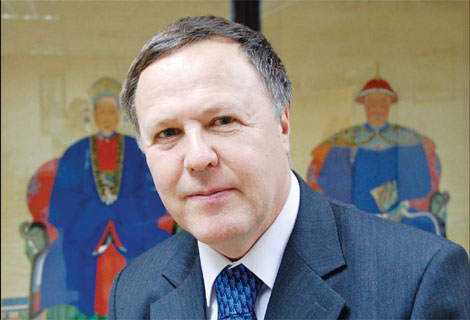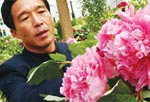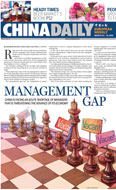Flying Finn
Updated: 2011-03-11 10:30
By Alexandra Leyton Espinoza (China Daily European Weekly)
Finnish aviation veteran helps pioneer China's european connection
Mikko Rautio has lived and experienced more of New China than most Chinese. He arrived in the 1950s aged three, lived in Beijing during the "cultural revolution"(1966-76), witnessed the opening-up period and has been a pioneer in developing China's aviation links to Europe.
 |
|
Mikko Rautio was one of the few non-Chinese who grew up in China during the |
In 1950, Finland was one of the first nations to recognize the People's Republic of China and just a few years later the Rautio family moved to the Middle Kingdom.
His father was a teacher at Beijing Normal University and his mother worked as a translator for China Pictorial. The Rautios were among the first foreign residents in the Chinese capital.
"I always knew that I was different, at the same time I wasn't discriminated against in any way. The rules at school were the same for everyone," he says.
From the late 1950s through to the mid-1960s, China was a peaceful place to grow up without any worries, Rautio says. But by the time he had turned 13 the "cultural revolution" changed everything.
"I was in middle school when the Red Guards took over the school. We were encouraged to criticize our teachers. I remember criticizing the way my teacher was dressed," he recalls.
"We were so young and naive and didn't know what was going on."
The same year, in 1966, schools closed and Rautio, like many others, spent most of his time at home. Thanks to some good friends who were members of the Red Guard he received a recommendation letter allowing him free train travel across the country. His first trip was to Guangzhou, which was a big adventure for a teenager.
"It was fascinating to be able to travel with all these youngsters during this time," he says. "You got affected by the changes happening in the country, the movement was everywhere."
The fact that Rautio had a better lifestyle than the average Chinese had not been an issue before, but some years into the "cultural revolution" he also became a "foreign" enemy. His friends were arrested and later interrogated just because they had lunch with him. As a result, many old friends shunned him.
"It was a very isolated time and was the most difficult time and worst experience in my life. But it made me stronger and more independent," he says.
In accordance with Finnish laws, Rautio returned to homeland when he turned 21 to do military service. His return home came as a relief.
"During my eight months in the army everyone complained how hard everything was, even sometimes too strict," he says. "For me it was heaven. I wasn't isolated anymore and living in a free environment."
 |
After military service, Rautio scored a job at Finnair, a company, which would become a major part of his life.
In 1973, the Finnish government began talks with China about an aviation agreement and the idea of opening a new flight path to China was developed during Nixon's visit in Beijing 1972. The trip between New York and Beijing was considered too long because most airlines at that time flew via the Middle East. A flight via Helsinki would save significant hours.
An initial agreement was signed in 1975, but Finnair staff needed training so Rautio, with his extensive experience in the Chinese culture and language, got the job.
However the process dragged out because of tense relations between China and the Soviet Union. "It took almost 13 years before we could launch our first non-stop flights between Helsinki and Beijing, in other words it was a long training period," he says laughing.
Rautio moved back to Beijing, and being an "China old hand" began assisting the Finnish press, artists, government officials and other visitors when they came to China.
Back then, foreigners living or visiting China had to apply for permission from the Chinese government if they wanted to travel, a procedure that took a long time.
"You couldn't travel otherwise, but it was always worth the hassle," he says.
"When I traveled to Xi'an they had just discovered the terracotta soldiers. My wife and I stood next to them but today you can just admire them from a distance."
During the 1980s, foreigners in China were the subjects of great curiosity and when locals saw Westerners on the streets it sometimes caused traffic jams.
"They looked shocked, and when I started speaking Chinese, they were even more surprised," he says. "Sometimes I felt like I didn't belong, today it's easier to be a foreigner, you melt in."
In 1988, when Finnair launched its first flights between Europe and China, about 95 percent of its customers were non-Chinese. "Today, the number of Chinese travelers has grown to 35 percent and that's huge growth in the aviation business," he says.
"The economic growth allows people to fly more. After buying an apartment and a car, you show your wealth by traveling abroad," he says.
"Today, most Chinese travelers are going to the South-east Asian countries due to government's policy, geographic convenience, and similar cultural background but Europe is getting more interesting even if their traveling customs are different from Westerners."
According to Rautio, a typical Chinese travel itinerary consists flying to Europe, traveling in buses, eating Chinese food and taking vast amounts of pictures.
"Chinese travelers spend more time on the road traveling than actually experiencing the countries they visit," he says.
"But that path is changing, the younger generation choose two countries but experience more.
"Paris and Rome is always a must for Chinese, unfortunately, not Finland," Rautio says laughing.
"We haven't been very good at promoting Finland, Helsinki is most of the time just a transit for our Chinese travelers who are heading onto other European destinations."
So what is this Beijing-raised, Finnish-born man's favorite travel destination?
"Wow, there are so many, but I like Spain and Portugal, good food, weather and even better wine," he says.
E-paper

Rise and shine
The Chinese solar energy industry is heating up following recent setbacks in the nuclear sector
Bombs aim for regime change
CSI, with a twist
Literary path
Specials

Peony express
Growers of china's unofficial national flower are reaching out to europe for help

Tea-ing up
More turning to Chinese tea for investment opportunities like vintage wine

A cut above
The ancient city of Luoyang is home to a treasure trove of cultural wonders.
